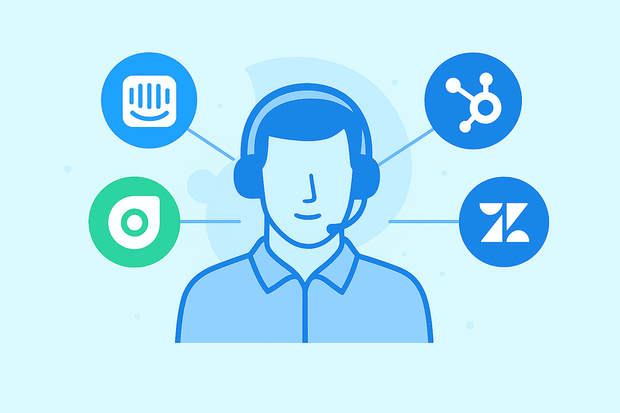Customer service platforms help businesses talk to their customers in real time through live chat on websites, mobile apps, or messaging channels like WhatsApp and Facebook Messenger.
Today, most customer support tools do much more than just live chat. They bring together help desk tools, CRM features, automations and chatbots, and analytics.
Over the years, these tools have evolved from simple chat widgets into complete customer experience platforms, connecting support, sales, and marketing in one place.
If you’ve ever wondered:
- Which chat platform is best for customer service in 2025?
- How do tools like Intercom, Zendesk, and HubSpot compare?
- What features actually make a difference for support teams?
You’re in the right place. In this article, we’ll compare the top 5 customer service platforms to help you choose the one that fits your business best.
Key elements of a great customer chat platform
Before diving into the tools, let’s look at what makes a great customer chat platform stand out.
These are the key factors we’ll use to compare the best customer support tools in 2025.
| Tool | Best for | Key differentiator | Limitations |
|---|---|---|---|
| Intercom | Growing teams needing scalable, AI-driven support. | Advanced AI with real-time messaging. | Complex setup. |
| HubSpot Service Hub | Businesses using HubSpot CRM. | CRM integration for unified customer data. | Fewer AI and automation options. |
| Zendesk | Large enterprises with structured workflows. | Powerful ticketing, AI assistants. | Expensive and less conversational. |
| Freshdesk | Small to mid-sized businesses. | Affordable AI support with Freddy and omnichannel tools. | Limited integrations and dated UI. |
| LiveChat | Startups and sales-focused teams. | Fast, conversion-focused chat with 200+ integrations. | Basic CRM and limited AI depth. |
Ease of use and onboarding
A support chat platform should be quick to set up and simple to navigate for both agents and customers. The best customer service chat tools offer clean dashboards, clear workflows, and helpful onboarding guides so teams can start chatting in minutes.
Once the team is onboarded, the next step is using automation and AI to make everyday support even faster and easier.
Automation and AI capabilities
Modern live chat software uses AI to do more than just respond faster. Think chatbots that qualify leads, suggest help articles, or even hand off conversations to the right agent automatically.
Strong automation saves time, improves consistency, and scales your support without growing your team. Of course, automation works best when the team's tech stack is connected, and that’s where integrations come in.
Integrations
If your customer data lives in your CRM, email conversations happen in Gmail, and your live chat messages sit in another tool, how will your team work efficiently?
Every time an agent needs context, they’ll shuffle tabs, look for notes, ask around. It’s time consuming and inefficient.
That’s why the best customer support platforms should integrate smoothly with your CRM, email, and messaging tools.
A well-connected chat platform pulls everything from messages and tickets to customer profiles and history into one view. With those connections in place, it becomes much easier to scale.
Scalability and pricing flexibility
As your business grows, your chat tool should grow with you. Scalable customer chat platforms offer flexible pricing tiers and features that adapt to different team sizes and support volumes, so you only pay for what you need.
And to make the most of that growth, you’ll need clear analytics to guide decisions.
Reporting and analytics
Tracking your team’s performance helps you improve, which, in turn, helps you retain customers. Chat software with strong reporting and analytics helps you monitor metrics like response time, resolution rates, and customer satisfaction.
Strong analytics also highlight where customers struggle most, helping you improve both service and reliability.
Want help finding the best customer service platform for your needs?
Now that we’ve covered what makes a great customer chat platform, let’s look at how the top customer service tools stack up. Below, you’ll find a quick overview of each, what they’re best for, their standout features, and where they fall short.
1. Intercom
Intercom is an AI powered customer service and messaging platform. What sets Intercom apart from competitors is its focus on conversational support.
It helps support teams manage customer conversations through a shared inbox, automation and AI, and live chat widgets.
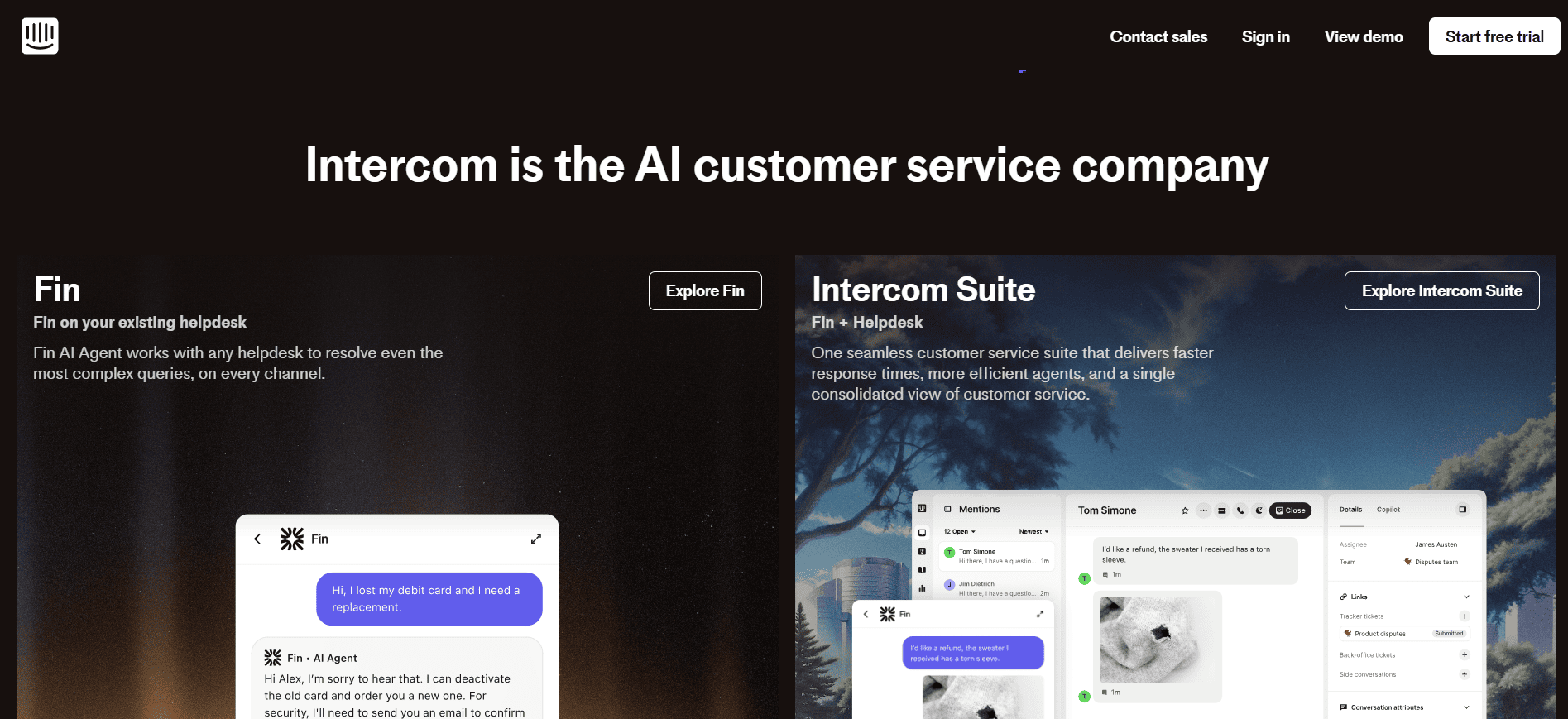
Here’s an overview of the key Intercom features:
- Messaging system and shared inbox that connects with website chat widgets, emails, and social media channels.
- Shared inbox for team collaboration
- Automated workflows for repetitive tasks
- Fin AI for handling customer conversations
- Reporting to track support team metrics like resolution time, CSAT, and AI vs. human performance.
- Integrations through the Intercom App Store and connector tools to extend it capabilities
Intercom is best for growing businesses and support teams that manage high volumes of customer conversations. It’s ideal for teams that want to scale with AI automation while still keeping a personal, human touch.
However, Intercom has a few limitations, like setup complexity and confusing pricing models.
2. HubSpot Service Hub
HubSpot Service Hub is an AI-powered, omnichannel customer support platform built on top of HubSpot’s CRM.
If you’re already using HubSpot for marketing or sales, Service Hub will feel like the natural extension of your tech stack.
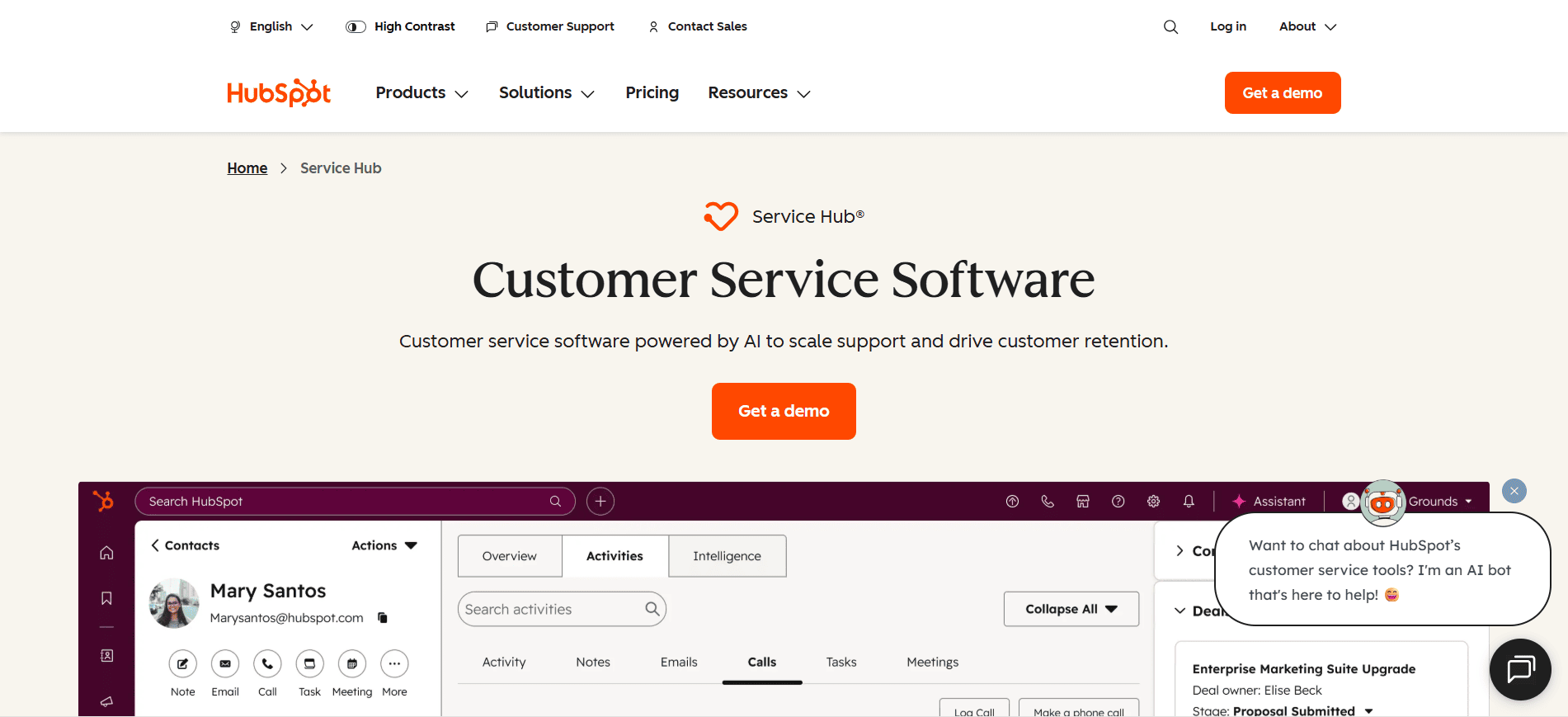
The Service Hub has a few key features for support teams, including:
- Shared inbox to keep all conversations from chat, email and forms in one view
- Omnichannel communication
- Automatic assigning of tickers based on priority, topic, or SLAs
- Native CRM integration
Overall, HubSpot Service Hub is suitable for teams already using HubSpot who want their support, sales, and marketing data fully connected.
While Service Hub is powerful, its chat customization options are limited compared to platforms like Intercom. Its AI automation features are still developing, and pricing can add up if you’re not already on HubSpot.
3. Zendesk
Zendesk is an enterprise-grade customer support platform. It's built for large teams that need structure, compliance, and detailed performance tracking.
It stands out from competitors because of its robust ticketing system and AI-powered voice and admin assistants.
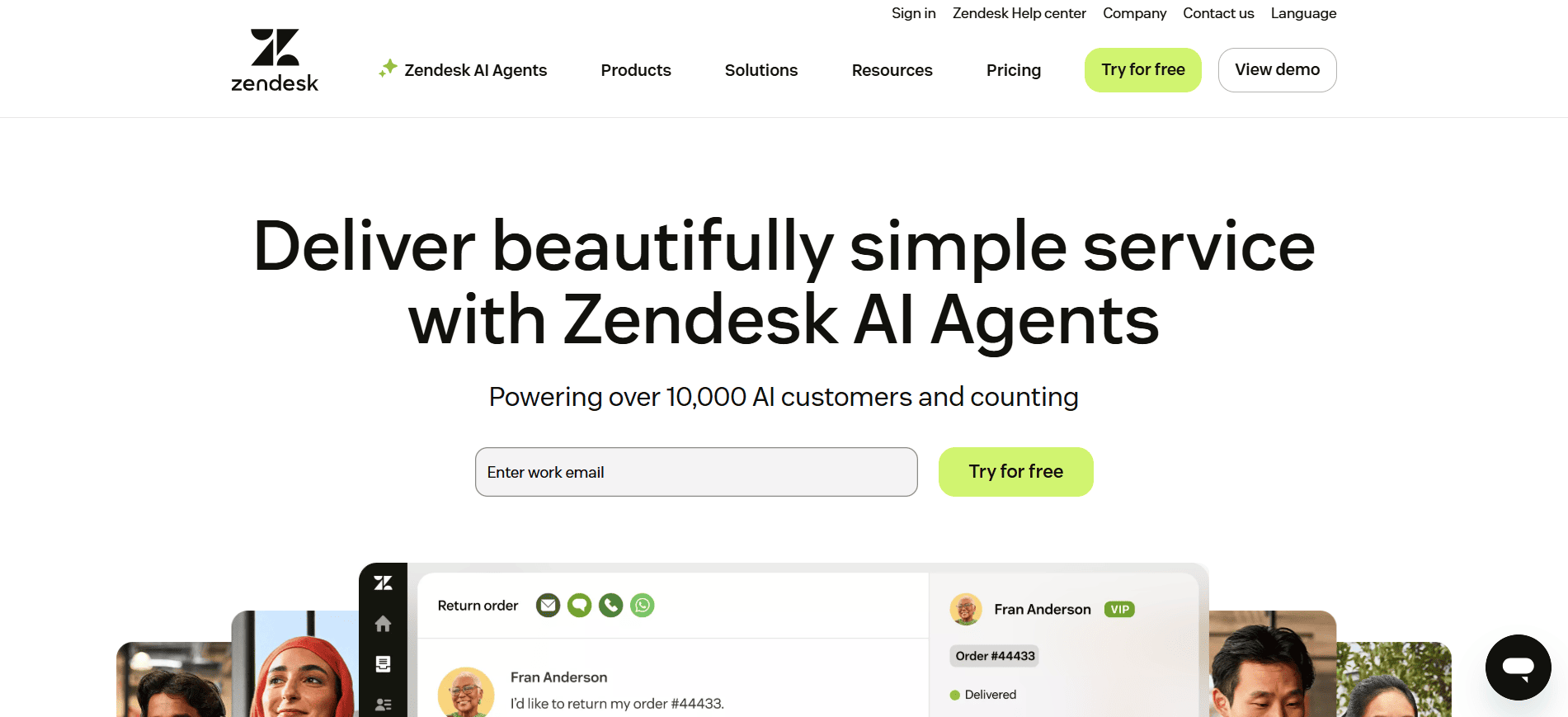
Zendesk brings every support channel, email, voice, chat, and social media, into one shared workspace.
Here’s a quick look at Zendesk top support features.
- Omnichannel ticketing to manage conversations from every channel in one workspace.
- AI voice and admin assistants for resolving simple issues and handling natural speech
- Automated workflows for routing tickets
- Customizable analytics dashboards for monitoring team performance
In short, Zendesk is best suited for large organizations or enterprise teams that need structured workflows, compliance, and comprehensive reporting.
However, it feels less conversational than newer platforms and can be costly for smaller teams. It also requires some administrative effort to maintain complex workflows and automations.
4. Freshdesk
Freshdesk is an AI-powered help desk tool for fast and affordable customer support. It brings all conversations from email, phone, chat, WhatsApp Business, and social media into one place.
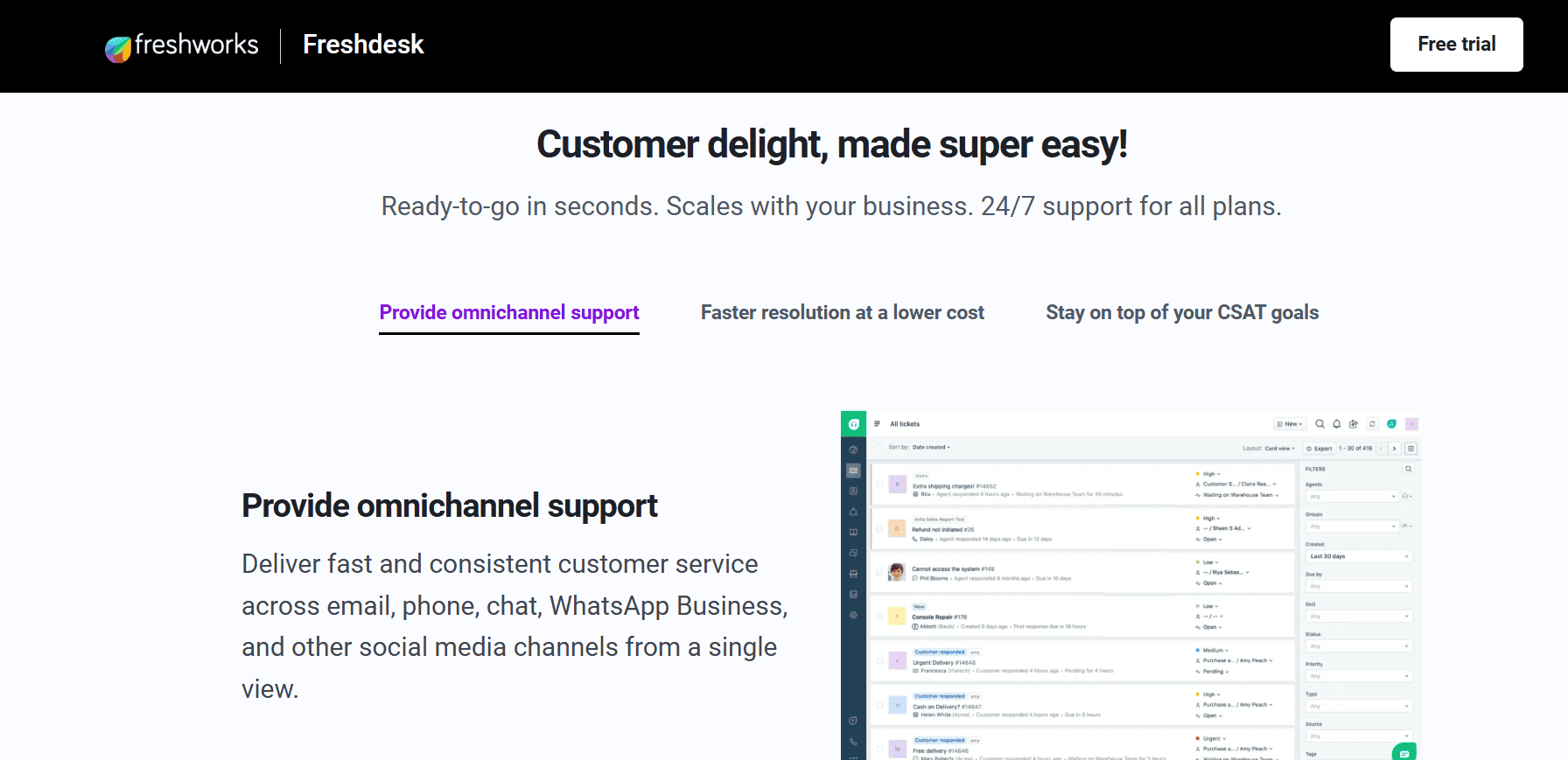
Freshdesk includes several features for efficient customer support:
- Omnichannel support for managing customer interactions from every channel in a single view.
- Freddy AI agent to automate common tasks, collect information, and resolve simple issues end-to-end.
- Automations for ticket assignment, follow-ups, and repetitive actions.
- Customizable analytics dashboards to monitor performance, track response times, and measure customer satisfaction.
Freshdesk stands out for being easy to use, budget-friendly, and quick to implement. It's a great fit for growing teams that don’t need the complexity of enterprise tools.
However, its interface feels dated compared to newer platforms, and its integrations can be limited for teams using custom software.
5. LiveChat
LiveChat is a real-time customer communication platform built for sales, lead generation, and light customer support. It’s quick to set up, easy for teams to use, and helps businesses engage website visitors instantly to boost conversions.
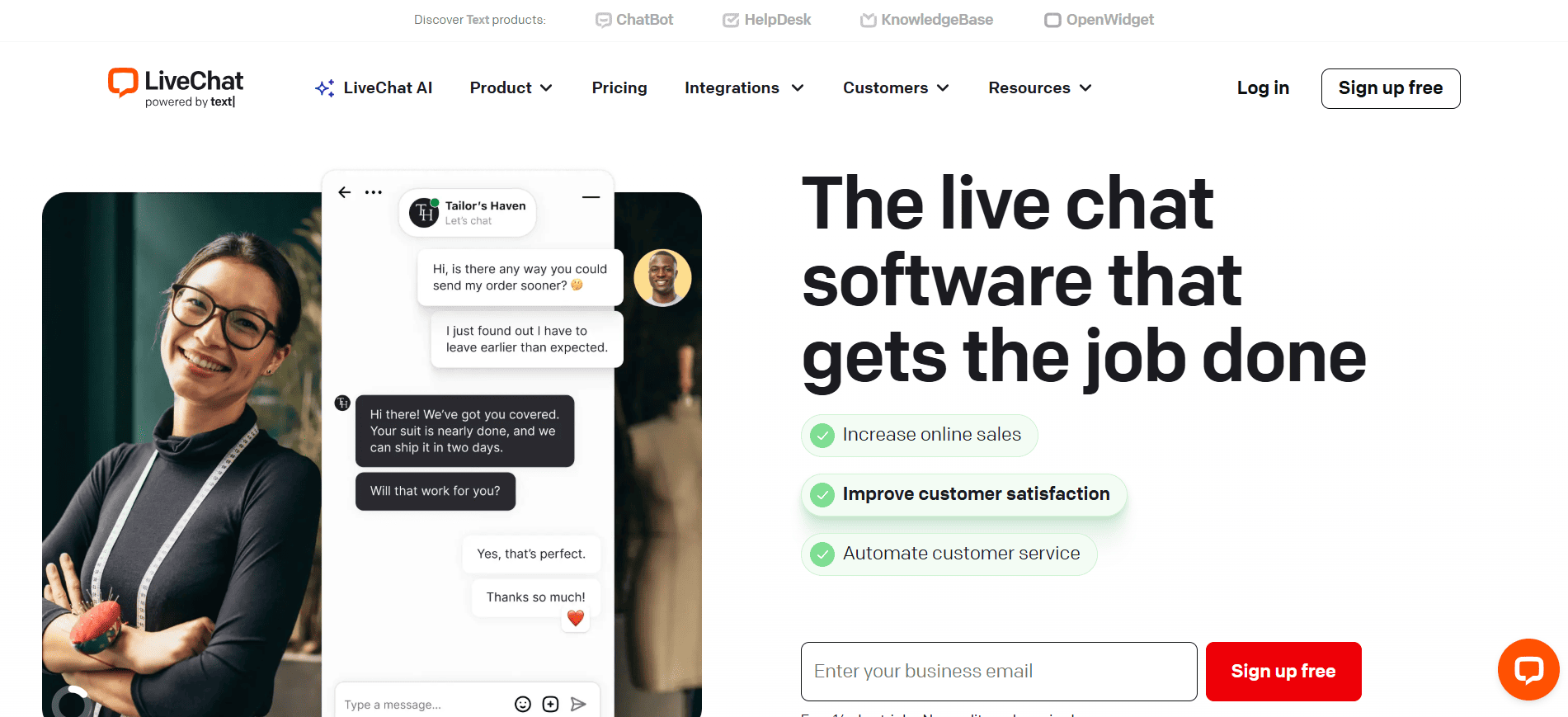
The platform combines live chat, automation, and analytics in a simple interface. LiveChat's key features include:
- Live chat and AI chatbots that reply automatically to FAQs and manage all routine interactions.
- Copilot AI assistant that provides real-time insights and assists agents directly inside the chat interface.
- Integrations with more than 200 apps like Mailchimp, Slack, WhatsApp, and Twilio.
LiveChat stands out for its simplicity, speed, and focus on conversion-driven engagement. It's ideal for startups and marketing teams that want to turn visitors into customers.
However, it’s less comprehensive for customer support operations with limited CRM depth, ticketing workflows, and AI sophistication compared to platforms like Intercom or Zendesk.
How to choose the right customer service software
How do you know which customer service platform is right for your business? It depends on how your team works, where your customers reach you, and how you plan to scale.
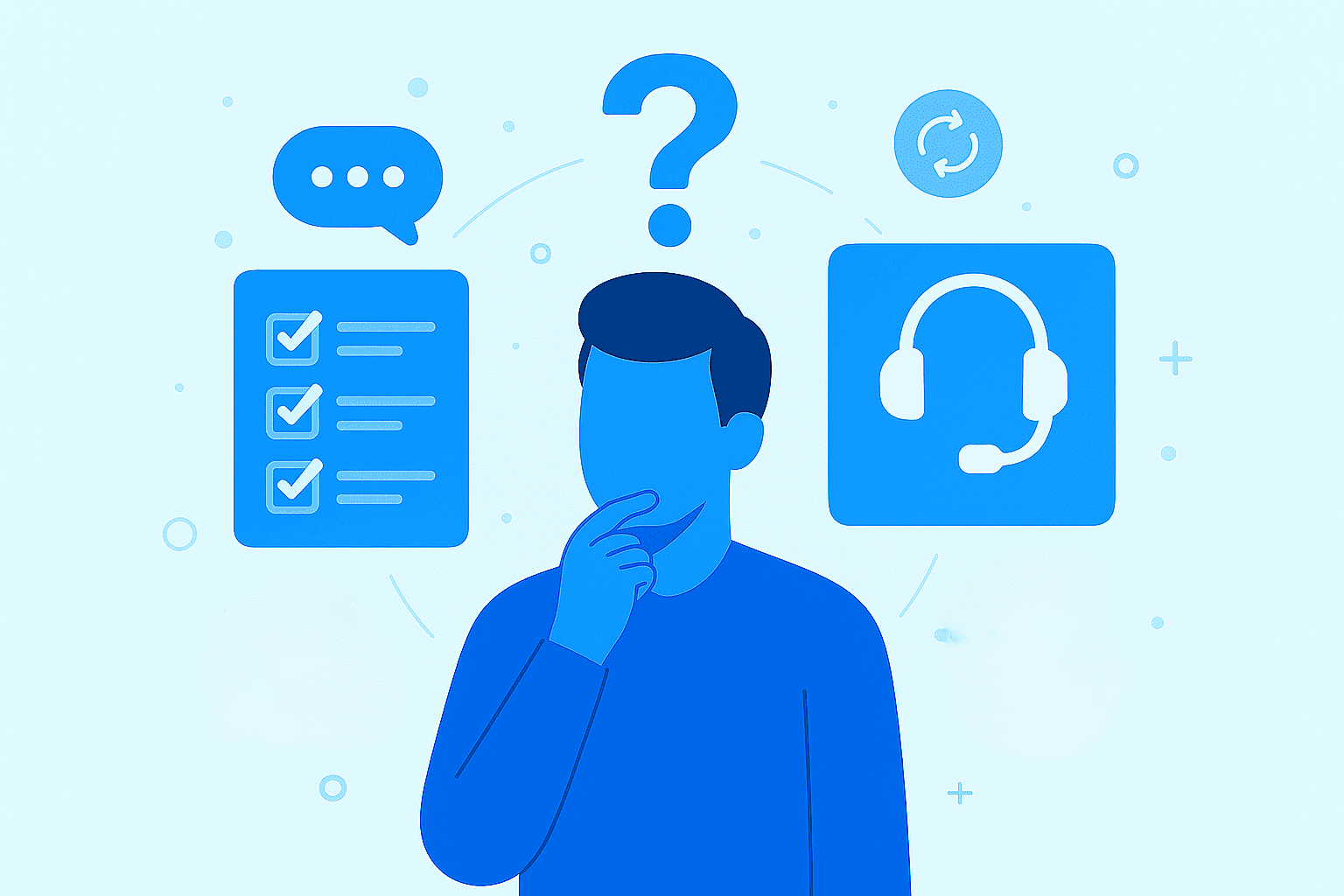
The right platform should make your support faster, smarter, and more connected.
Here’s a simple checklist to guide your choice:
- What channels do you use most (email, WhatsApp, chat, or social)?
- How large is your support team, and do you expect it to grow soon?
- Do you need advanced AI automation or just a reliable live chat tool?
- How important is reporting and analytics for your managers?
- Does your team work across multiple regions, languages, or time zones?
- Which CRM, marketing, or sales tools do you already rely on?
- How easily can your current systems integrate with a new platform?
- What’s your scalability horizon (3–5 years)?
- Do you need internal collaboration features (shared inbox, notes, tagging)?
- What’s your budget flexibility, monthly, per-agent, or usage-based?
Even if you choose a tool that doesn’t have many native integrations, you can use a third-party integration platform like Octopods, which connects Intercom and HubSpot to social media and messaging channels.
How to get the most out of customer service tools
Knowing how to integrate customer service software can make a huge difference in how your support team performs.
Even advanced tools like Intercom, HubSpot, or Zendesk become far more powerful when they’re connected to the rest of your tech stack.
Here’s what strong integrations can help your team achieve:
- Centralized conversations: You can manage messages from email, chat, and social media in one place without losing context.
- Smarter automation: Integrations expand tools' automation capabilities, which means you can route, prioritize, and track tickets automatically using CRM and workflow data.
- Full customer visibility: Connecting tools gives agents full visibility into customer conversations, data, and full history.
Many businesses use integration platforms like Octopods to connect messaging apps such as WhatsApp, Telegram, and Messenger inside Intercom. This unified view ensures no customer query is missed and every message gets the right response.
Struggling to manage your customer chats on different platforms?
Final thoughts
Finding the best customer service platform in 2025 isn’t just about features. It’s about fit.
Tools like Intercom, HubSpot, or Zendesk can all deliver great results when aligned with your team’s goals and workflows. Still, the real value comes from connecting them through smart customer service integrations that keep data, conversations, and automation in sync.
When your tools work together, your support team works smarter, and your customers feel it.
FAQs
What is the best customer service chat software?
The best customer service chat software in 2025 depends on your business size and goals. Intercom is often considered the top choice for scaling teams that want AI automation, multichannel support, and strong CRM integrations.
Is Intercom better than HubSpot or Zendesk?
It depends on your business goals. Intercom is often considered better for companies that prioritize automation, AI, and integrations. HubSpot Service Hub, on the other hand, is stronger if you want tight CRM integration and visibility across marketing, sales, and service in one place. Zendesk stands out for scalability.
In short:
- Choose Intercom for automation and customer engagement.
- Choose HubSpot for CRM alignment.
- Choose Zendesk for high-volume support and ticketing.
Which customer chat platform offers AI automation?
Intercom, HubSpot Service Hub, Zendesk, and Freshdesk all include AI automation features. Intercom leads with its advanced AI chatbots, while HubSpot Service Hub uses AI for ticket routing and conversation summaries. Zendesk and Freshdesk also offer AI-powered agents that automate responses and routine tasks to speed up support.
Can I connect messaging apps to customer service software?
Yes, most modern customer service platforms let you connect messaging apps like WhatsApp, Facebook Messenger, and Telegram. This allows your team to manage all customer conversations from one inbox. Tools like Octopods make it even easier by integrating these channels directly into platforms such as Intercom or HubSpot.

